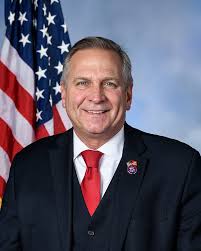WASHINGTON, DC — Republican legislators are looking to expand VA’s use of community care further with the coming Congress. House VA Committee chairman Michael Bost (R-IL) has introduced legislation that would fill perceived gaps in the 2018 Mission Act, requiring the department to offer more private-care alternatives to veterans.
Over the last several years, Bost, along with other Republicans on the committee, have regularly accused VA leaders of hamstringing the Mission Act, which consolidated and expanded VA’s community-care programs. They believe that VA employees have either directly or surreptitiously dissuaded veterans from using community-care options in an attempt to protect funding for VA’s direct care system. The draft legislation of the complete Mission Act is partly designed as a bulwark against that.
Among many other provisions, the bill cements current access standards. For primary-care appointments, that means veterans with more than an average 30-minute drive to a provider or a wait of 20 days or more must be offered community care. For specialty care, the standards are 60 minutes and a 28-day wait. It would require VA to publish the wait times at all VA medical centers and forbid schedulers from factoring telehealth options when determining whether appointments are available at VA.
It would require VA to notify veterans immediately when it’s determined they are eligible for community care, and to send periodic reminders of that eligibility. If denied a referral to community care, VA must inform the veteran immediately, giving the reason for the denial and providing instructions on how to appeal.
The legislation would also direct VA to establish a pilot program at no fewer than five VA sites that would allow veterans access to community mental health and substance abuse services without a referral or preauthorization from VA.
“The MISSION Act transformed the delivery of healthcare to veterans across the nation, especially in rural and remote areas of the country. But under the Biden-Harris administration, we have seen VA bureaucrats standing in the way of veterans’ community care access,” Bost said. “Every veteran has earned timely options for quality healthcare to meet their needs. No bureaucrat is allowed to stand in the way of that.”
Despite accusations that VA is hindering veterans from seeking community care, the program has grown in recent years. In 2018, VA spent $2.8 billion on community providers. That grew to $24 billion in 2023. Since 2020, the number of veterans eligible for community care has grown by 500,000 and currently stands at about 2.8 million of the 9.1 million veterans enrolled in VA.
Speaking on the issue at a recent press conference, VA Secretary Denis McDonough said that the MISSION Act is the law and that VA follows it. He also noted how veteran satisfaction with direct care is only growing. Veteran satisfaction with outpatient care is at 91.8% according to a 2024 survey of users—up 30% from the year prior.
“Veteran satisfaction is exceedingly important to how we provide care at VA. It is the most current, the most up-to-date assessment we can get about what veterans believe about what is happening in the system,” McDonough said. “[The 91.8% rating] tells me veterans in large measure feel good about what’s happening.”
Recent surveys of users of private healthcare had satisfaction rates nowhere near that, he added.
McDonough was direct about the choice the country faces in how it intends to provide care to veterans.
“There is a big question for the country to resolve: What do we want this system to be able to do?” he said. “We should just be really clear with veterans and with the taxpayers about what we mean by that when we do it. I think it would be a shame to lose the strength of this VA system … in terms of what it does for veterans and what it does for every other American. If we want to move away from a system that has 400,000 VA professionals, a system where 75% of doctors in the country have some of their training in the VA system. If we’re going to move away with that, let’s make sure we’re leveling with the American people on that. And let’s make sure we have a system that makes up for the roles VA plays.”



